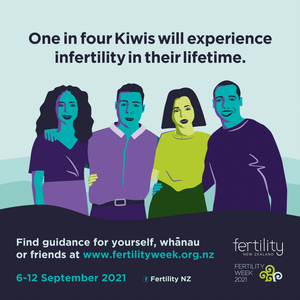Fertility New Zealand walks alongside all people facing fertility challenges.
Infertility in New Zealand
Any of us can face challenges building whānau
As many as 26% of New Zealanders will experience infertility during their lifetime
Infertility is defined as a lack of conception after 12 months unprotected intercourse, or difficulties retaining a pregnancy
IVF has around 30% chance of a baby per cycle of treatment
Infertility is equally attributable to male and female issues – in about 40% of infertile couples the problem is a female factor, in about 40% it is a male one and for the remaining 20% there is a joint problem, or the cause is unknown
Māori men and women are just as likely as non-Māori to experience infertility
Secondary infertility (to people who already have one child or more) is just as common as primary infertility
Men and women with low incomes and/or less educated are just as likely to experience infertility as those who have higher incomes/qualifications
Single people and those from the Rainbow community rely on the generosity of donors and surrogates to become parents
Infertility affects both urban and rural New Zealanders infertility is one of life’s most stressful events
There are many causes of infertility; common diagnoses include poor sperm quality, count, motility; ovulation disorders; premature ovarian failure; endometriosis and hormonal imbalances – to name a few
Fertility declines with age for both women and men, although the effects are more dramatic and earlier for women
Treatments for fertility issues are many and varied. Some common treatments include medications to improve the production of eggs, surgery on the fallopian tubes to fix blockages, vasectomy reversal, insemination of the woman with either the partner’s sperm or with donor sperm (IUI), in vitro fertilisation (IVF) or IVF with intra cytoplasmic sperm injection (ICSI)
Lifestyle improvement including optimising weight; exercising moderately and regularly; and eliminating smoking, drugs and minimising toxins, caffeine and alcohol can help chance of conception. Some people try complementary treatments such as acupuncture and naturopathic treatment
Some New Zealanders qualify for publicly funded fertility treatment. Criteria include BMI requirements, time trying to conceive, and number or presence of existing children

